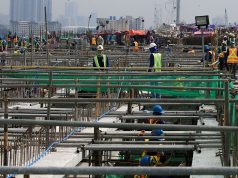Senators: Charter change not to extend terms
SENATE President Aquilino Martin L. Pimentel III on Friday allayed concerns by some local groups in Baguio City over charter change being fast-tracked to extend President Rodrigo R. Duterte’s term.
“Our party (referring to PDP-Laban) has been advocating for federalism since 1982….This is not for the President. Don’t be afraid of the ghost that isn’t really there,” he said at the Senate hearing on charter change held at the University of the Cordilleras in Baguio City.
The Senate committee on constitutional amendments and revision of codes, chaired by Senator Francis N. Pangilinan, is on its fourth leg of regional consultative hearings in Baguio City. Among the other senators present at Friday’s hearing were Senators Paolo Benigno A. Aquino IV, Panfilo M. Lacson and Maria Lourdes Nancy S. Binay.
Youth and indigenous peoples (IPs) groups told the hearing that Mr. Duterte and his allies wanted to hasten charter change in order to extend their terms.
“In the course of charter change, we see Duterte being the proponent, the House of Representatives, the allies of the President who are so keen on rushing that they want (to) omit the Senate in the process,” said Maria Meryll Isidro of the Student Council Alliance of the Philippines.
“The CPA is critical of present attempts to amend or revise the 1987 Constitution for we believe it is not limited to proposing a shift to federalis as the efforts are actually aimed at granting the President dictatorial powers,” said Abigail Anongos of the IP group Cordillera Peoples Alliance (CPA) Committee.
Mr. Pimentel defended the ruling party’s federalism advocacy, stressing that they wanted regional empowerment and decentralization of resources to be elevated as constitutional concepts.
“We want it to be constitutional concepts so it’s demandable as a matter of right by the beneficiaries of the set-up like the local government unit,” he said.
He clarified that the Senate is not rushing charter change, adding that: “The public should understand this first. If there is no solidarity, if the concept of solidarity is not embedded in our hearts and minds, I will be the one (to) say that we should not proceed with federalism.”
“My advice is: read all the proposals but don’t be alarmed (by) the proposals because these are not the official proposals…If the Office of the President releases the official version, let us criticize or support,” he added.
For his part, National Commission for Indigenous Peoples (NCIP) commissioner in Cordillera Basilio A. Wandag said indigenous peoples have called for the inclusion of an “IP state” as among the proposed federal states in the country based on the agency’s consultations with the IP groups.
“Should the change bring about a new system of government from unitary to federal, we want a place in it. It must include an ICC (indigenous cultural communities), IP state or states or region, autonomous region, or special region or whatever it may be called,” he said.
Integrated Bar of the Philippines (IBP) Baguio-Benguet Chapter President Alan Antonio S. Mazo proposed the creation of a “Deputy Chief Justice” position who would later become Supreme Court Chief Justice upon the retirement of the incumbent SC chief.
“My reason is to insulate the judiciary further from any political pressure,” he said. — Camille A. Aguinaldo



